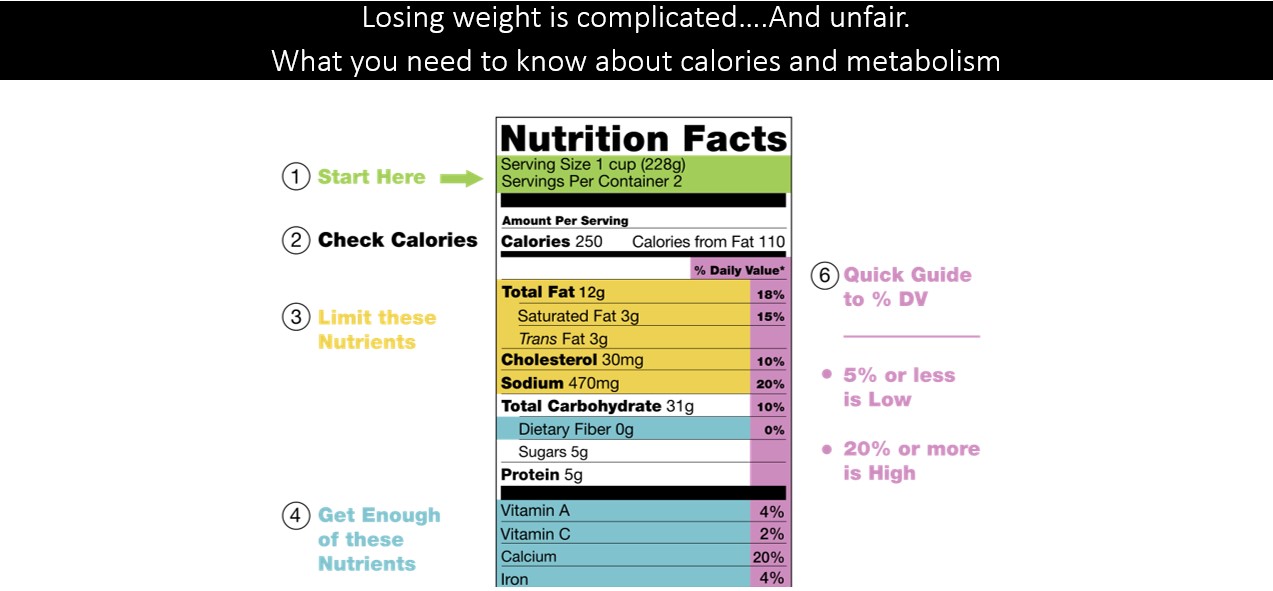Losing weight is complicated….And unfair. What you need to know about calories and metabolism
It sounds like common sense: Reduce your calories and lose weight, increase your calories and gain weight.
The concept sounds so foolproof that it led to the commonly-held conclusion we have believed for decades: “Eat less, move more,” and you will shed pounds.
But this advice is flawed. It’s not that simple. Anyone who has found himself/herself trying to lose weight but failing to do so—by restricting calories and moving more—can attest to this.
Why? Well to start, the calories in, calories out theory doesn’t tell us anything about your age, gender, body composition or hormone levels, nor does it tell us about your macronutrient intake, your training style, your genetic makeup, or whether you’re taking any medications etc etc…
And it certainly doesn’t tell us about your metabolism: the process your body goes through to convert what you eat and drink into energy.
Metabolism aside for a moment, there are a few other warnings to note about calories:
A. Don’t trust labels:
Check out this Precision Nutrition article that explains that food labels can be off by as much as 20 to 25 percent (https://www.precisionnutrition.com/food-labels)!
B. Consuming calories isn’t the same as absorbing them:
The amount of energy we eat in the form of calories isn’t always equal to the amount of energy we absorb, store or use. This comes down to our metabolism, as well as the type of calories we’re eating, hence the idea that“calories aren’t created equal.”
In short, we absorb less energy from carbohydrates and fats that are minimally process and more energy from highly-processed carbohydrates because they’re easy to digest. Further, whether a food is cooked or raw also makes a difference in what we absorb from it.
C. Enter gut health:
Oh the importance of gut health, once again…
We absorb food differently depending on the types of bacteria we have in our gut, hence the whole probiotic craze we have been inundated with in recent years (probiotics are known to help increase the good bacteria in your gut, which helps you absorb nutrients more effectively).
Back to the unfair truth about metabolism:
When it comes to metabolism, we aren’t created equal. And we’re definitely not created equal when we break down our metabolism into four categories:
- Resting metabolic rate, or RMR
We all differ in terms of the number of calories we burn when we’re simply just resting (breathing, thinking, sleeping etc…). Things that affect your RMP either positively or negatively include your genetic makeup, your body composition, your age etc, your fitness level, and on and on.
- Fitness and metabolism
Again, we all burn calories differently when we workout (kind of why you can’t trust what the rowing machine or bike is telling you about how many calories you just burned). This changes depending on how much exercise you do. In other words, more consistent fitness can help your metabolism speed up.
- Non-exercise activity thermogenesis
We talked about resting metabolism and working out metabolism. Non-exercise activity thermogenesis, on the other hand, is basically everything in between. It’s the energy you burn when you’re going about your daily life, sitting down, standing up, fidgeting, doing dishes, talking, laughing etc. Once again, this also varies from person-to-person.
- Thermic effect of eating
This is basically how many calories you burn just by eating (and digesting and processing your food). Once again, this varies considerably from person to person.
Before you start cursing the people you know who can seemingly eat whatever they want because their metabolisms are on fire, let’s consider ways you can improve your metabolism so your body becomes more effective at absorbing your food and using it as energy.
5 Simple Ways to amp up your metabolism
- Eat Protein
Protein helps improve your thermic effect of food, meaning you’ll burn more calories while you’re eating and digesting. Read more here (https://www.ncbi.nlm.nih.gov/pmc/articles/PMC4258944/)
- Drink more water
Some research shows drinking more water can help speed up your resting metabolism. Read more here (https://www.ncbi.nlm.nih.gov/pubmed/19661958).
- Workout more
We already covered this one, but exercise—especially lifting weights and high-intensity work—goes a long way in speeding up your metabolism—not just the calories you burn when you workout, but also your resting metabolism and your non-exercise activity thermogenesis. This study explains that high-intensity training can help your metabolism speed up for up to 14 hours after a workout: (https://www.ncbi.nlm.nih.gov/pubmed/21311363).
- Sleep, sleep, sleep
Sleep, and sleep disorders, such as sleep apnea, have a huge impact on metabolism. Check out this for more (https://www.ncbi.nlm.nih.gov/pmc/articles/PMC2929498/), and check out our Sleep Apnea series (link to June #4 and #5 blogs).
And even if you don’t have sleep apnea, just not getting enough sleep can alter glucose metabolism, as well as hormones involved in regulating metabolism, like leptin and ghrelin. There’s a reason they call it beauty sleep.
- Omega 3’s
There’s some evidence that taking a fish oil supplement rich in Omega-3 fatty acids can help speed your metabolism, largely because it is believed it helps decrease the chances of leptin resistance, which is linked to how your body burns fat.
More research needs to be done here, but even if fish oil doesn’t help your amp up your metabolism, there are many other well-known health benefits that come from taking Omega-3 fatty acids. Read more about why fish oil is important in our recent Fish Oil blog:
Give it a try for 30 days: Increase protein intake (and decrease carb intake), more water, consistent working out, go to bed earlier, and fish oil it up on a daily basis. Then report back.







